Tuesday 11 February 2020 8:17am
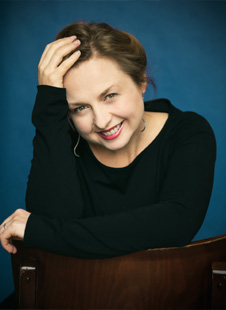
Holly Mathieson. Photo courtesy of Martin Stewart, 2018
Otago alumna and award-winning conductor Holly Mathieson takes music to audiences in every corner of society. One week she might be taking the stage in an opera house or for a ballet company or an orchestra, and the next performing on mountain summit, in far flung islands, or in a supermarket.
A rarity in the world of conducting – only around three per cent of professional conductors are women – Holly's impressive biography includes recently conducting the London Symphony, BBC Concert, Royal Philharmonic, City of Birmingham, London Philharmonic and Scottish Chamber Orchestras.
As well as performing in glittering music venues, Holly is also Co-Artistic Director of the Nevis Ensemble, a project which aims to take music out of the concert hall and into isolated and marginalised communities. In the last two years, the ensemble has given 170 free performances to around 25,500 people across Scotland, from a farm in the Scottish Borders to the summit of Ben Nevis in the Highlands.
Holly Mathieson and members of the Nevis Ensemble talk about taking quality, fun and interactive orchestral performances to communities around Scotland. (Video courtesy Nevis Ensemble)
In 2016 Zonta New Zealand named her one of New Zealand's Top 50 Women of Achievement. Currently living in Glasgow, Holly has just taken up a three-year appointment as Music Director of Symphony Nova Scotia in Halifax, Canada. She'll be splitting her time between Canada and the UK, and we caught up with her during a concert tour with English Touring Opera.
Q and A with Holly
 Firstly, can you give us a little background on your childhood, and growing up in Dunedin?
Firstly, can you give us a little background on your childhood, and growing up in Dunedin?
I was born and bred in Dunedin, and due to a car accident in my early years, and the subsequent death of my mother, ended up spending significant amounts of time with my maternal grandmother, a well-loved pianist on the Dunedin music scene. Her influence on my musical development was very significant.
I realise now, having taught at several universities around the world, she was teaching me high-school level harmony and musicianship before I'd even started school. It's like a language I suppose; if you start that young, you pick it up far more easily than you would even just a few years later. I would love to understand the science of it, but I wonder if it's something to do with synaptic development. If the skill is being taught at the same time the brain is creating its pathways, it becomes integral to the brain's development in some way. Whereas learning it after that early brain development has already occurred via other means, one has to channel the learning through existing routes, somehow. There must be a PhD in that somewhere…
When I was a teenager, I was very lucky to be taken under the wing of another mum, whose support and love has had an enormous influence on my career, including encouraging me to attend private lessons in composition with the late Associate Professor Jack Speirs. He had met me as a child and informally assessed my musical interests, and in my mid-teens offered to take me on as a student, once a week. My rather visionary high school principal at Kavanagh College, Paul Ferris, allowed me to take Wednesday afternoons off in order to go down to the Music Department and study composition.
 What fostered your passion in music?
What fostered your passion in music?
Funnily enough, music wasn't really my passion – that slot was filled by ballet. I studied with Glenda Simpson up in Roslyn, an incredibly dedicated and kind teacher. She knew my early family situation, through doing stage shows with my birth mother, and really took me under her wing for many years. Music – or, rather, the piano – was something I rebelled against for much of the time. But looking back, it was incredibly therapeutic and cathartic, as a little one going through a fair bit of trauma. Between that and ballet, the self-expression and discipline of those activities not only helped to shape the sort of adult I grew into, but also helped me to keep my head above water through some tough times.
 What do you remember about your student days at Otago, any special highlights or memories?
What do you remember about your student days at Otago, any special highlights or memories?
Those early composition lessons with Jack were one of the highlights of my week – he was a superb teacher, an old-fashioned mentor. Short on words of praise, and quite reserved, but supportive and challenging in healthy balance.
The social life at the department was lovely too. It was quite small, and there was quite a bit of interaction between the year levels. Many of us performed with each other in various choirs, orchestras and bands around the city, too, often alongside members of staff. So, it was a very close social network.
My two PhD supervisors were superb: on the one hand, Professor Sue Court had the calm assurance of someone who'd run the race many times over, and in contrast I was one of the first supervisions Dr Alan Davidson took on, so he really poured his heart and soul into feeding me with literature, ideas and friendly nudges to keep me going.
 Your PhD is in Music Iconography, can you explain what that is?
Your PhD is in Music Iconography, can you explain what that is?
Music Iconography ties in aspects of musicology, music history and art history, by investigating the representation of music through visual art. This can include investigating aspects of organology, performance practice and the sociological or cultural history of music.
My own thesis dealt with visual representations of conductors between 1840 and 1940, and included various types of source material including formal portraiture such as oil portraits and daguerreotypes [an image on a silvered copper plate], satirical caricatures and written descriptions from the time of various aspects of the conductors' physical appearances and technique.
 Why did you choose conducting as a profession?
Why did you choose conducting as a profession?
There was never a particular point in time that I decided to pursue it. It was just well-suited to my brain and personality traits, which meant people asked me to do various things, and then I suppose the tenacious part of my character didn't want to walk away from it.
Now that I'm working fulltime as a conductor (which took many years to achieve, I must add) I can see there are other aspects of it that are ideal for me, too. It is generally short to mid-term project-based work; involves extensive travel and, therefore, interaction with varied languages and cultures; and there is a part of it that requires constant learning.
Each opera or major symphonic work on my schedule offers the chance to delve as deeply as time allows into a new language or regional dialect, a specific period or aspect of history, or links to other fields. For instance, this week I'm working on Sibelius' epic symphonic suite The Lemminkäinen Legends with an orchestra in Scotland – it comes in the middle of working fulltime with English Touring Opera in London, so preparation time is very tight. But it opens up the chance to investigate Sibelius' compositional history and style, and the performance and reception history of the work, but also the tales from the Finnish epic, the Kalevala, from which it draws its subject matter. If a question about the name of the Finnish underworld ever comes up in a pub quiz, I'll be sorted!
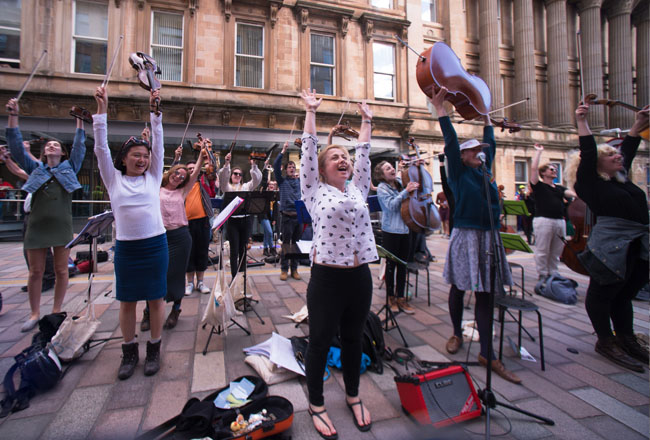
The Nevis Ensemble in Glasgow. Photo courtesy of Tommy Ga-Ken Wan
 How did Otago and Dunedin help shape your path and your career success?
How did Otago and Dunedin help shape your path and your career success?
There is an incredibly supportive base in Dunedin. If someone puts up their hand and says they want to try something, the opportunity will be found somewhere. It is quite unique in that respect.
Like many of my predecessors from the Music Department, such as Tecwyn Evans and Michael Joel, I left Dunedin with a breadth and depth of professional experience that many of my colleagues from North America and the UK didn't find until they'd finished postgraduate study at a specialist conservatoire or college. Dunedin Symphony Orchestra (then the Southern Sinfonia), Opera Otago, the Southern Consort of Voices, and Southern Youth Choir all offered me work long before I deserved it.
 What do you regard as your significant career achievements or personal highlights?
What do you regard as your significant career achievements or personal highlights?
I was very lucky to assist Marin Alsop the night she was the first women in history to conduct the BBC Last Night of the Proms. It was superb to be a fly on the wall for that deeply significant moment in history.
I also did a reasonably short-notice jump-in to conduct Stravinsky's Rite of Spring with the London Symphony Orchestra to a hall full of teenagers. None of them were music students, but you could feel their eyes widening and jaws dropping as that glorious kaleidoscope of timbral colour exploded in front of them. To know that their first ever live orchestral experience was of a woman conducting was pretty special, too.
I worked backstage on quite a few private concerts for Prince Charles at Buckingham Palace and Windsor Castle, with European royalty and exclusive guests in the audience. It was an extraordinary glimpse into a world I don't entirely support, with rows of Rolls Royces and chauffeurs in the courtyard, and the dignified procession of jewels, gowns and tiaras, in the middle of a city full of people struggling to maintain even the most basic of lives. Breathtaking and horrifying in equal measure, I would say.
Many of the more recent highlights have been far humbler, but I would say more important to me, and have come through the Nevis Ensemble. My husband and I are the ensemble's Co-Artistic Directors. We take a 40-piece orchestra to play for free in isolated communities (whether they be isolated geographically, financially, politically or through circumstances such as ill health, aged care or prison sentences). It's a mad socio-musical experiment, requires tremendous amounts of energy, good humour and emotional endurance, and has so far seen us play at the top of the UK's highest peak, on its most remote island, and also in some very ordinary places like supermarkets, schools, swimming pools and refugee centres.
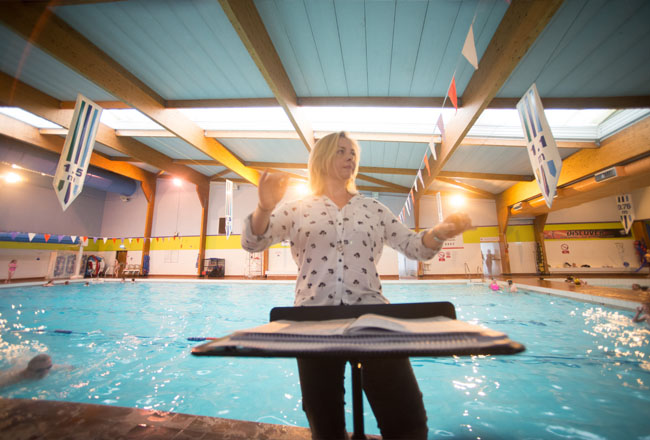
Holly Mathieson conducting the Nevis Ensemble at a swimming pool in Ayr, Scotland. Photo courtesy of Tommy Ga-Ken Wan
 Not every conductor will have done a concert tour by jetboat – can you tell us a little about that?
Not every conductor will have done a concert tour by jetboat – can you tell us a little about that?
One of Nevis' madder adventures, it must be said. The St Kilda Archipelago lies about 40 miles west of the Outer Hebrides, way out in the Atlantic Ocean, and has a fascinating history in terms of its human occupation. The final islanders were evacuated in the 1930s, having lived an incredibly isolated and hardy existence with a population ranging between 30 and 180 people for nearly two millennia.
The islands are now protected by various cultural and natural heritage covenants, as they are so unique – including the resident wild sheep, which are the most undiluted ancient breed of sheep in the world. The only human residents now are a team of scientists, conservation workers and volunteers, plus some military personnel. They can only live there for part of the year, as it isn't safe to travel out there by sea or air in the winter months. They accept some tourist groups, but the journey is reasonably dangerous, and entirely weather dependent.
We met some locals who'd been trying for decades to make it out there, so how we managed to get a 40-piece orchestra with instruments there and back in a day to perform for the seasonal residents, I'm not sure. It required four jet boat trips, including one that ran out of fuel on the way there and drifted in the Atlantic for about an hour surrounded by breaching whales and sea birds, and a rather hair-raising return journey for those of us on the last boat in near darkness, with an Atlantic storm chasing behind us, and just the pommels of the jet boat to hold onto (bear in mind the players were also clutching their instruments with one hand). That was terrifying, but the day was a once-in-a-lifetime experience, especially given that all secular music making and culture had been banned from the 19th century onwards by a zealous reverend who'd been sent from the mainland to civilise the islanders.
 Women conductors are a rarity, has it been hard to reach your position? What have been the challenges?
Women conductors are a rarity, has it been hard to reach your position? What have been the challenges?
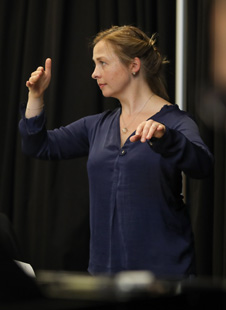
Holly Mathieson, NZ Opera 2019, Turn of the Screw. Photo courtesy of Michael Bradley
Current estimates sit the number of women in professional orchestra or opera conducting positions at about three per cent. It's pretty dire. And, as it requires such a long period of training before you'll be let anywhere near a professional group (in my case, piano and composition through primary and high school, and then about eight years of tertiary study and private lessons throughout Europe), it will be a long time before we see any significant change in those numbers, even though there is a concerted effort in the industry to move towards greater equality.
Thus far, however, that push for “diversity” has only really been aimed towards gender equality. It is a start, and I'm very grateful to be entering the industry at just the right time to surf the wave, but there is so much more to be done in terms of BAME [Black, Asian and minority ethnic] musicians, and trying to find sustainable pathways into professional arts training for people from lower socio-economic backgrounds. But that begins right at the start of the food chain, when politicians make decisions about the allocation of funds for music education.
In most parts of the world, serious instrumental study is really only available to those whose parents can afford to pay for it privately. It may seem a luxury that needn't be offered as part of a basic education to all school children, but the role creativity plays in a child's intellectual and social development is enormous, and I believe we see the repercussions – in society more generally, as well as in the profession – further down the line, in all sorts of manifestations.
For me, it would have been impossible without the love, support and patience of mum, my husband and the rest of my immediate family in NZ. Everyone has helped me out at various points when money has been tight, work has been thin or I've wavered in my drive to keep going. And there's a toll on one's private life, too - despite having 13 nieces and nephews around the world, I think I've made it to only two birthday parties in 18 years, and parenthood really won't be a viable option for Jon and I due to our touring schedules.
 Do you return often to New Zealand, and what do you enjoy when you do?
Do you return often to New Zealand, and what do you enjoy when you do?
It seems to ebb and flow, depending on which contracts I pick up with the orchestras and NZ Opera, but at the moment it seems to be sitting at about twice a year, mainly in the North Island – but I always try to tack on a trip down south to see family. The first enjoyable experience is that initial breath of fresh air when you step out of the airport, especially if I've come straight from London. It's like an injection of instant good health and vitality. Also, NZ's superb seafood, sushi and craft beers are always a pleasure to indulge in! And I usually try to tack on at least a couple of nights in Wanaka with mum, or if not, she'll come and visit while I'm working for a bit of a city break and catch-up. It's amazing how resilient your family relationships can be, actually – my sister Katie and I usually start up the conversation just where we left off, regardless of how long it's been!
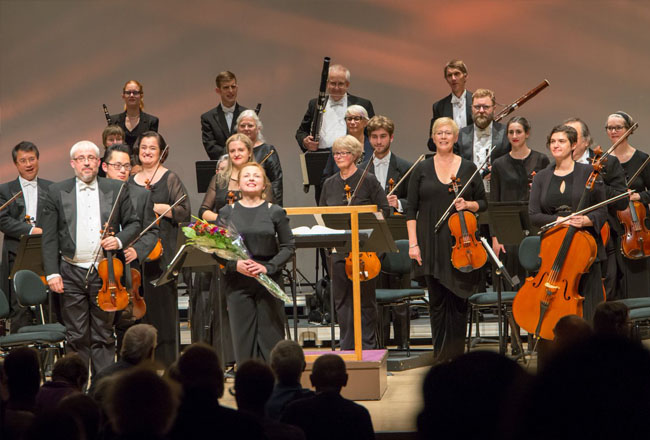
Curtain Call with Symphony Nova Scotia 2018
 You have just been appointed Music Director of Symphony Nova Scotia, Halifax, Canada, on a three-year contract. What are you looking forward to most about your new role?
You have just been appointed Music Director of Symphony Nova Scotia, Halifax, Canada, on a three-year contract. What are you looking forward to most about your new role?
It's funny to have been born in the southern-most Scottish diaspora in the world, settled in Glasgow, and now find myself travelling regularly to the northern-most Scottish diaspora. I clearly have a Scottish obsession. The landscape and lifestyle in Nova Scotia are superb. Flying into Halifax airport in the “fall” is the most gobsmacking vision of russet and gold, as the leaves turn.
From a professional perspective, it'll be the first time I have the opportunity to build a long-term relationship with an orchestra, develop a repertoire specific to my time with them, and play a part in their long-term artistic and strategic development. I'm glad it's happening when it is. I have the confidence that I do actually have something worthwhile to bring to the orchestra and their audience, which I'm not sure I would've even two years ago. But, also, they are just as interested in being a little experimental and creative as I am.
I'm hoping we can really try to do something quite unique in terms of where the orchestra situates itself in the fabric of the city, and how it contributes to community welfare and cohesion, and bridging gaps between different subsets of the population.
